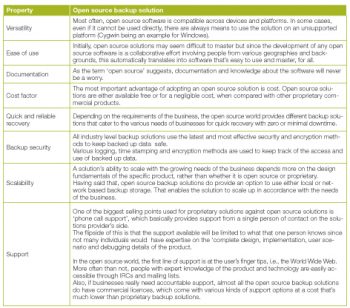There cannot be a single definition for a perfect backup solution, as the needs of every organisation vary based on the type and amount of data that needs to be backed up. But there could be a set of criteria to determine the design of a perfect backup solution.
Lets discuss a few parameters here:
1. Versatility: How versatile is the solution? What this implies is that at a time when we access and update data through various end points (when directly connected as well as via mobile devices), the solution cannot be either device-specific (desktops and mobiles) or platform-specific (Linux/Windows). It must have the capabilities to work on all types of devices and across all platforms.
2. Ease of use: An ideal backup solution must be easy to implement/deploy and use. It must not require any specific tool or domain expertise. Anyone with basic business/technology knowledge must be able to use it.
3. Adequate and comprehensive documentation: Availability and easy access to the documentation for any industry solution is very important when choosing from among various available options.
4. Cost of implementation and maintenance: Another deciding factor will be cost of adapting the solution and the associated cost of maintenance.
5. Quick and reliable recovery: Most of the above parameters can be termed as general, which any industry solution ought to possess, whereas the efficiency of the backup solution is generally determined by how easily, quickly and most important, reliably a system can recover from a failure with minimum downtime. An ideal backup solution must ensure zero downtime.
6. Security of backed up data: Data breaches and threats from hacking are among the biggest hazards to the industry today, the Sony incident being an example. An ideal backup solution must not only create a reliable backup but must also store it in a trusted and hacker-proof environment.
7. Support: Another important feature for any industry level solution is to know the level and quality of support available for it.
8. Scalability: Last but not the least, one must be sure about how easily the solution is scalable to the future needs of the organisation.
Open source backup solutions
The industry is full of proprietary or, rather, commercial backup solutions. The open source world, too, has evolved in leaps and bounds to provide hundreds of cost-effective and easily available alternatives, designed to cater to every possible need of an industry.
Some of these are Amanda, Areca Backup, BackupPC, Bacula, Duplicity, Zamanda Recovery Manager and the list goes on. All of these specialise in the backup requirements of particular industries.
So, are open source backup solutions industry-ready?
My answer would be that, yes, they are. The table given below shows how open source solutions measure up against the characteristics of an ideal backup solution.
References
[1] https://en.wikipedia.org/wiki/List_of_backup_software
[2] https://en.wikipedia.org/wiki/Backup_software
[3] http://www.enterprisestorageforum.com/backup-recovery/open-source-storage-49-tools-for-backup-and-recovery-1.html
[4] http://www.ntconnections.net/blog/entry/3-characteristics-of-a-quality-data-backup-solution












































































